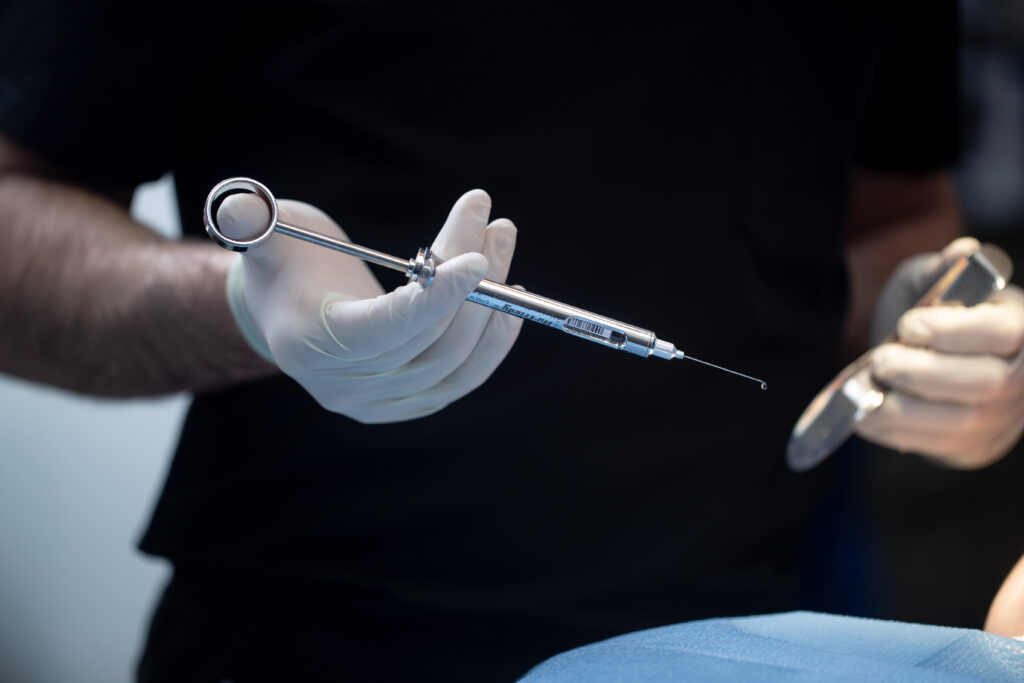What to expect
General Anesthesia
There are four main choices for anesthesia. Depending on your procedure and comfort level your oral surgeon will recommend one of the following:
- Local Anesthesia
- Nitrous Oxide Sedation with Local Anesthetic
- Office Based General Anesthesia with Local Anesthetic*
- Hospital or Surgery Center Based General Anesthesia
For Patients Receiving General Anesthesia
- NO Food or Drinks
Do NOT eat or drink anything after midnight prior to surgery, not even water. (gum or mints are also not advised)
- 18 and Under
If you are less than 18 years of age, you MUST have a legal guardian accompany you on the day of surgery. That person must stay in the office during the procedure and escort you home after surgery.
- Your Driver
Your driver needs to arrive with you to the
appointment and remain in the waiting area
during your procedure.
- Clothing Requirements
Please wear loose-fitting clothing with sleeves that can be rolled up past the elbow, and comfortable walking shoes. Open-toed shoes are not advised, tennis shoes are recommended.
- NO Contact Lenses
Remove contact lenses before surgery. Please leave them at home.
- Beauty Products
DO NOT wear lipstick, makeup, excessive
cologne/perfume, or nail polish on the day
of surgery.
- Medications
Take any pre-medications that were prescribed to you.
- Valuables
Leave all valuables at home. No cell phones
will be permitted in the surgical suite.
What to expect.
Local Anesthesia
Description of Technique
The patient remains totally conscious throughout the procedure. A local anesthetic (e.g. lidocaine) is administered in the area where the surgery is to be performed. Local anesthetic is used in conjunction with the other methods of anesthesia in all oral surgery procedures.
Usual Indications
Simple oral surgery procedures such as minor soft tissue procedures and simple tooth extractions.
Nitrous Oxide Sedation with Local Anesthetic
Description of Technique
A mixture of nitrous oxide (laughing gas) and oxygen is administered through a nasal breathing apparatus. The patient remains conscious in a relaxed condition. Nitrous oxide has a sedative and analgesic (pain- controlling) effect.
Usual Indications
Simple oral surgery procedures to more involved procedures such as removal of wisdom teeth and placement of dental implants.
Office Based General Anesthesia with Local Anesthetic*
Description of Technique
Medications are administered through an intravenous line (I.V.). The patient falls asleep and is completely unaware of the procedure being performed. Medications most commonly used are Fentanyl (opiate), Versed (benzodiazepine), Ketamine, and Propofol. Supplemental oxygen is delivered through a nasal breathing apparatus and the patient’s vital signs are closely monitored.
Usual Indications
General anesthesia is available for all types of oral surgery. A patient may choose general anesthesia for simple procedures depending on their level of anxiety. Most people having their wisdom teeth removed or having a dental implant placed will choose general anesthesia. General anesthesia may be necessary if local anesthesia fails to anesthetize the surgical site which often occurs in the presence of infection.
Hospital or Surgery Center Based General Anesthesia
Description of Technique
A patient is admitted to a hospital or surgery center where anesthesia is administered by an anesthesiologist.
Usual Indications
Indicated for patients undergoing extensive procedures such as face and jaw reconstruction and TMJ surgery. Also indicated for patients with medical conditions such as heart disease or lung disease who require general anesthesia.

To administer general or IV anesthesia in the office, an oral surgeon must have completed hospital based anesthesia training. Qualified applicants will then undergo an in office evaluation by a state dental board appointed examiner. The examiner observes an actual surgical procedure during which general anesthesia is administered to the patient. The examiner also inspects all monitoring devices and emergency equipment and tests the doctor and the surgical staff on anesthesia related emergencies. If the examiner reports successful completion of the evaluation process, the state dental board will issue the doctor a license to perform general anesthesia. The AAOMS administers an office anesthesia evaluation program and examination that must be completed every 5 years Dr. Merlo is also an anesthesia examiner for the Maryland State Board of Dental Examiners and maintains ACLS and PALS certifications. He is also Board certified in Dental Anesthesiology as well as Oral & Maxillofacial Surgery.
We are also very proud that our anesthesia assistants have passed the optional DAANCE national anesthesia certification exam. This is a difficult process and enhances the safety of our anesthesia safety.
Again, when it comes to anesthesia, our first priority is the patient’s comfort and safety. If you have any concerns regarding the type of anesthesia that will be administered during your oral surgery procedure, please do not hesitate to discuss your concerns with your doctor at the time of your consultation.
Intravenous Sedation (“Twilight Sedation”)
Our office offers our patients the option of Intravenous Sedation or Dental Intravenous Anesthesia or to some it is referred to as “Twilight Sedation” for their dental treatment. Intravenous Sedation or “twilight sleep” helps you to be comfortable and calm when undergoing dental procedures. Your treatment can be completed under intravenous sedation. Intravenous sedation or “IV sedation” (twilight sedation) is designed to better enable you to undergo your dental procedures while you are very relaxed; it will enable you to tolerate as well as not remember those procedures that may be very uncomfortable for you. IV sedation will essentially help alleviate the anxiety associated with your treatment. You may not always be asleep but you will be comfortable, calm and relaxed, drifting in and out of sleep – a “twilight sleep”.
If you choose the option of intravenous sedation your IV sedation/anesthesia is administered and monitored by the doctor therefore eliminating the costly expense of having your treatment carried out in an operating room or same day surgical facility.
How is the IV sedation administered?
A thin catheter will be introduced into a vein in your arm or hand. This will be attached to an intravenous tube through which medication will be given to help you relax and feel comfortable. Once again some patients may be asleep while others will slip in and out of sleep. Some patients with medical conditions and/or on specific drug regimens may only be lightly sedated or may require treatment in a hospital setting.
The goal of IV sedation is to use as little medication as possible to get the treatment completed. It is very safe, much safer than oral sedation. With IV sedation a constant “drip” is maintained via the intravenous tube. At any time an antidote can be administered to reverse the effects of the medications if necessary. Along with IV sedation there are also other different “levels” of sedation available to you in our office.
Nitrous Oxide (Laughing Gas)
Nitrous Oxide is a sweet smelling, non irritating, colorless gas which you can breathe. Nitrous Oxide has been the primary means of sedation in dentistry for many years. Nitrous oxide is safe; the patient receives oxygen along with the nitrous gas. Patients are able to breathe on their own and remain in control of all bodily functions. The patient may experience mild amnesia and may fall asleep not remembering all of what happened during their appointment.
There are many advantages to using Nitrous Oxide
- The depth of sedation can be altered at any time to increase or decrease sedation.
- There is no after effect such as a “hangover”.
- Inhalation sedation is safe with no side effects on your heart and lungs, etc.
- Inhalation sedation is very effective in minimizing gagging.
- It works rapidly as it reaches the brain within 20 seconds. In as few as 2-3 minutes its relaxation and pain killing properties develop.
Get to know us.
At Washington Oral & Facial Surgery, we know how to help you. Our board-certified surgeons and expert staff can provide the care you need to relieve the discomfort you feel.


